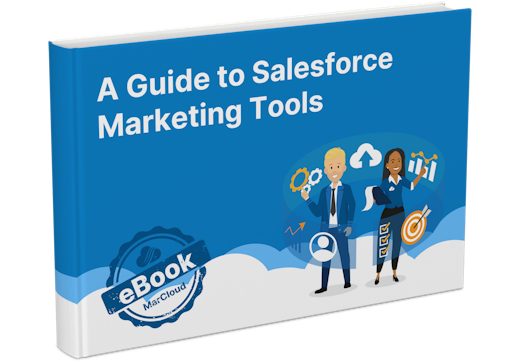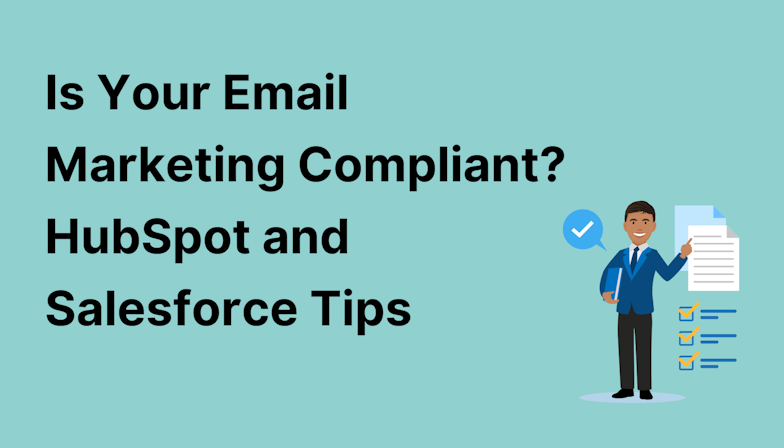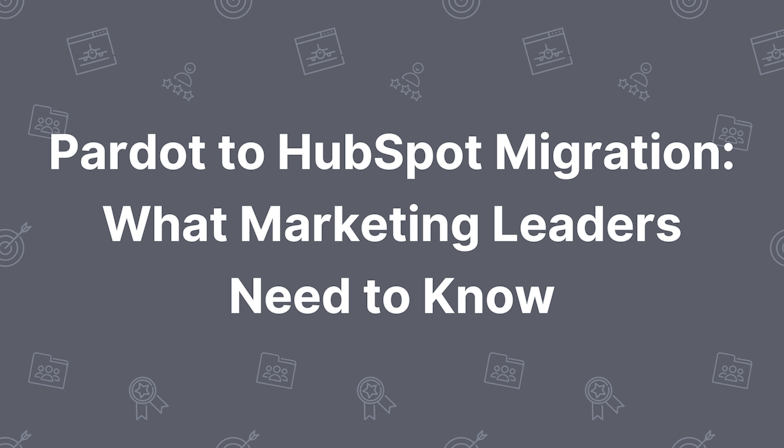With a huge variety of Salesforce applications to choose from, it can be daunting trying to decide which ones to choose. Here at MarCloud Consulting, we often get questions surrounding the differences between Salesforce Sales Cloud, Service Cloud and Commerce Cloud.
This blog will briefly outline each application, identify the differences and how each can be utilised to benefit your organisation, so it’s easier to decide which application we should be using and when - if not all of them.
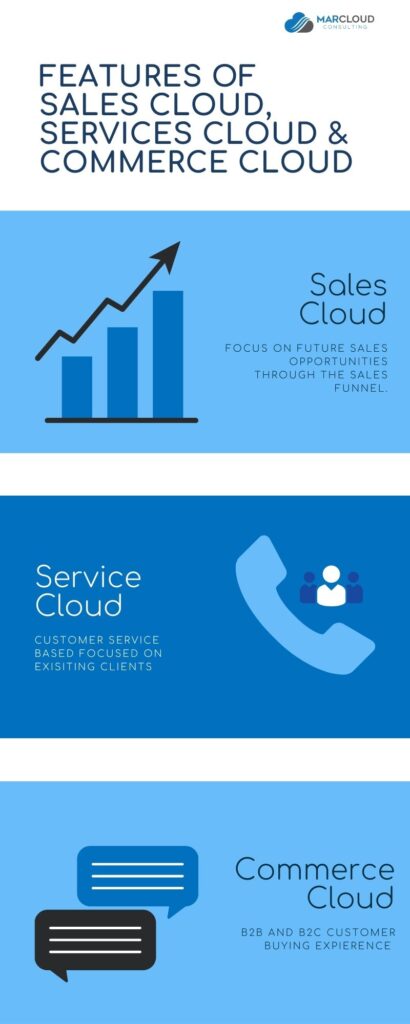
Features and differences between Salesforce Sales Cloud, Service Cloud and Commerce Cloud.
What is Salesforce Sales Cloud?
Salesforce Sales Cloud was designed to engage with potential and future customers through sales forecasting, contact and opportunity management.
This is a powerful tool to create and track revenue through the entire sales cycle, enabling users to manage customer relationships appropriately.
You may recognise the interface, as this is the most interacted with application amongst Salesforce users. We are able to view all customer data which is detailed in their lead/contact profile within Salesforce, showing interaction activity and current sales status.

Sales Cloud primarily focuses on the sales aspects of customer relationship management (CRM), in how users manage Leads, Contacts, Accounts and Opportunities, rather than providing customer service.
Without having to rely on our colleagues for updates, we are able to have visibility over every conversation attached to an Opportunity, aiding the ways we can push customers through the sales funnel and how we can increase our sales performance.
Sales Cloud reduces the time spent on administrative tasks by providing automatic features, so the sales team can focus on closing Opportunities!
So, why should we be using Sales Cloud?
- To unify Salesforce teams to provide an integrated journey for customers and as a result, productivity within Salesforce.
- Improving customer service through diligent marketing and sales collaboration, managing customer retention.
- For more in-depth customer insights, tracking valuable customer data, enabling clean and accurate reporting.
- To create a responsive sales strategy based on market changes, allowing us to forecast accordingly.
What is Salesforce Service Cloud?
Now, this is where it can get confusing. Like Sales Cloud, Salesforce Service Cloud includes the same features…
Unlike Sales Cloud, Salesforce Service Cloud looks at customer service in addition to sales performance and therefore includes extra task specific features.
Built onto Salesforce Customer 360, this customer support platform allows one-to-one interaction, providing an overall streamlined and personalised experience between Salesforce users and customers.


The main differences between Sales Cloud and Service Cloud are the additional features provided to aid customer service. Some of which are Omni-Channel Routing, CTI Integration and Web-to-Case.
- With Omni-Channel Routing, tasks are distributed to Salesforce users/agents based on specific skill sets and availability. In short, tasks are distributed evenly, ensuring workloads are manageable and productivity is heightened. This is particularly important as tasks that are flagged as important can be dealt with as a priority.
- Computer Telephony Integration (CTI) links phone and computer systems together to route calls to the appropriate agent for help, logging the call information, in addition to multiple other uses to increase efficiency.
- Web-to-Case looks at integrating customer service forms into your website to link with the Salesforce instance. Once submitted, this information is converted to a case in Salesforce and passed onto an agent for faster response time.
Note: a full list of additional features will be displayed at the end of this blog.
Benefits of using Salesforce Service Cloud
- Increased productivity through unified experience and automated work-arounds.
- Support customers further with additional material for raised queries, strengthening customer relationships
- Flexibility in communication channels, with customer preference in mind.
- Resolve raised cases quickly with customer data visibility.
Table of differentiating features. Note: Add-ons are additional paid features:
| Features |
Sales Cloud |
Service Cloud |
| Accounts, Contacts |
x |
x |
| Leads, Opportunities |
x |
x |
| Reports, Dashboards |
x |
x |
| Campaigns |
x |
x |
| Tasks, Activities |
x |
x |
| Products, Assets, Quotes |
x |
x |
| Calendars, Events |
x |
x |
| Forecasts, Territory Management |
x |
x |
| Chatter |
x |
x |
| Custom Apps, Tabs & Objects |
x |
x |
| Self-Service Portal |
x |
x |
| Cases, Solutions |
x |
x |
| Visual Workflow |
x |
x |
| Service Cloud Console |
|
x |
| Service Entitlements |
|
x |
| Service Level Agreements |
|
x |
| Visual SLA Timelines |
|
x |
| Omnichannel Routing |
|
x |
| CTI integration |
|
x |
| Web-to-case |
|
x |
| Add-On: Live Messaging |
£ |
|
| Add-On: Live Agent |
£ |
|
| Add-On: Knowledge Base |
|
£ |
| Add-On: Service Cloud Portal |
|
£ |
What is Salesforce Commerce Cloud?
Finally, we have Salesforce Commerce Cloud. This application is based solely on the customer buying experience on commerce channels. Designed for digital entrepreneurs, Commerce Cloud simply looks to enhance the buying experience.
By introducing a predictive intelligence, we are able to tailor a personalised shopping experience to our clients, making this an important feature to enable!
Commerce Cloud has two different platforms: B2C Commerce and B2B Commerce.
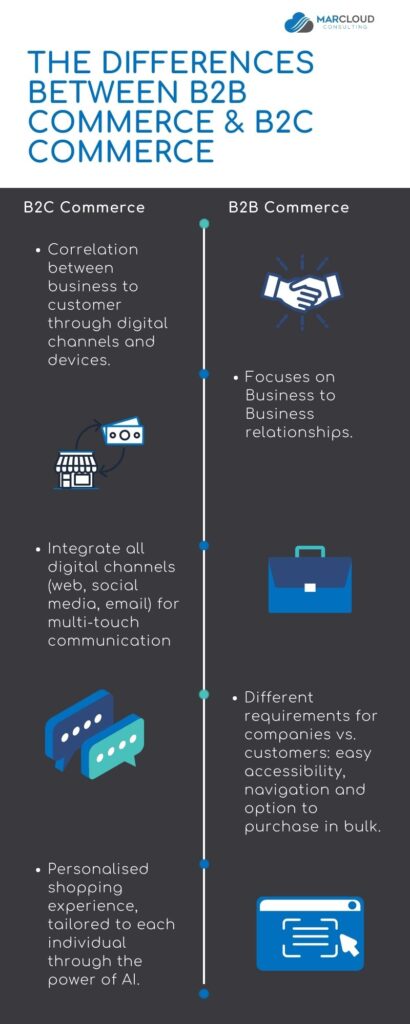
B2B integrates with Sales Cloud and Service Cloud to track commerce data of customers. This is a powerful feature to utilise as both buyers and sellers have visibility over important metrics e.g. products brought and negotiated price vs listed price, creating a streamlined purchasing process driven by conversation over the customer’s preferred channel.
3 clouds, 3 differences
So, simply put, the differences between these applications is the purpose in which they are intended to be used.
- Sales Cloud - Application to view, track and report on sales processes.
- Service Cloud - Communication and customer experience based application to aid customer’s buying journeys.
- Commerce Cloud - based on buying experiences across all channels for B2B and B2C companies.
I hope this alleviates any confusion between the three Salesforce Cloud Apps! If you have any questions about Salesforce Sales Cloud or other Salesforce products such as Pardot, please get in touch.

